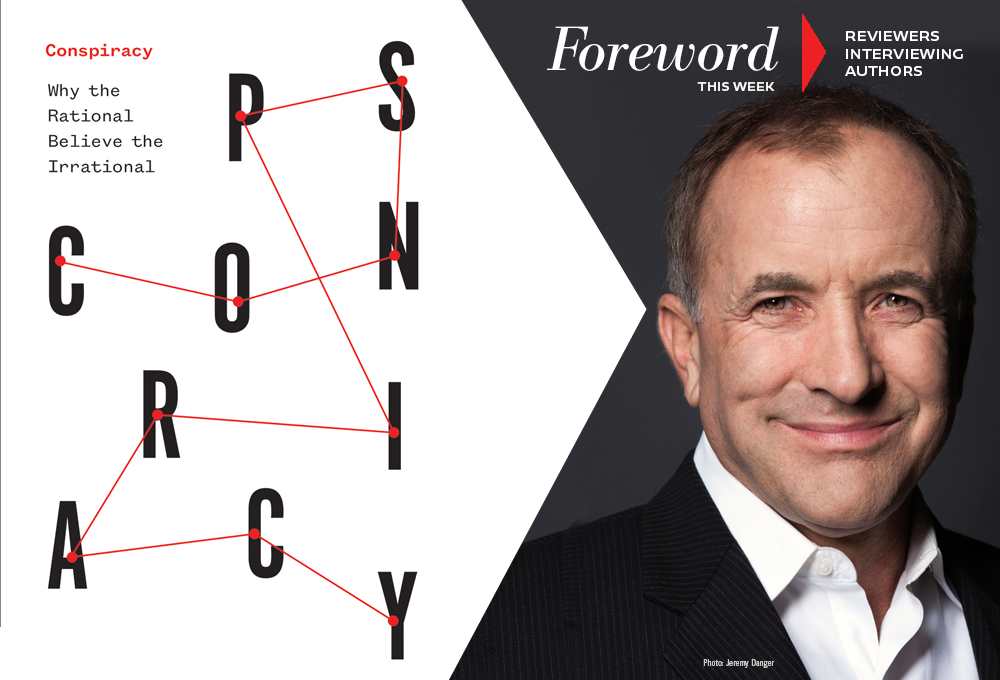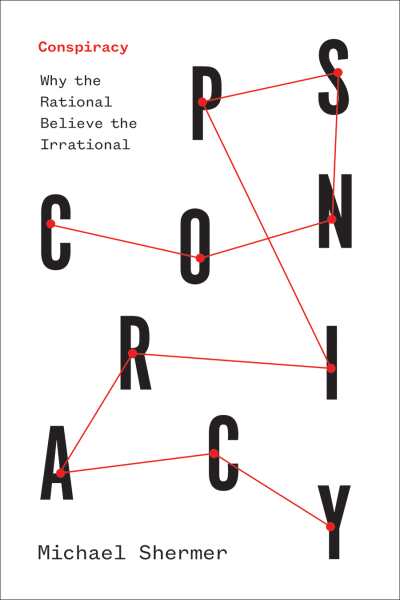It looks like you've stumbled upon a page meant to be read by our code instead of viewed directly. You're probably looking for this page.
Reviewer Kristen Rabe Interviews Michael Shermer, Author of Conspiracy

Today’s interview is about the dangers of conspiracy, and during this week of US midterm elections, the topic should make all of us worry about our constitutional democracy.
You think we exaggerate?
Take Donald Trump’s Stop the Steal conspiracy, a cavalcade of lies that promote the notion that untold numbers of scheming Democrats somehow rigged the 2020 presidential election. Trump’s lying misled hundreds of angry election officials to change voting rules to make it easier for some citizens to vote and more difficult for others—all in the noxious pursuit of voting integrity. Stop the Steal is also being weaponized by the politicians who say they’ll only accept election results IF THEY WIN! Mind you, no voting fraud of any consequence was discovered in 2020, 2016, or any other recent election.
So, yeah, conspiracies can do serious damage.

We’re here with Dr. Michael Shermer, perhaps the world’s foremost authority on the whos, whats, whys, and hows of conspiracy. The founder of Skeptic magazine, an eighteen-year columnist for Scientific American, and the author of several bestselling conspiracy-related books including Why People Believe Weird Things, The Believing Brain, and most recently, Conspiracy: Why the Rational Believe the Irrational, Michael agreed to take a few questions from Kristen Rabe, she being the author of a review of Conspiracy in Foreword’s November/December issue.
With conspiracy theories flooding the media—including Pizzagate, Birtherism, and Stop the Steal, to name a few—this book seems breathtakingly timely. Are conspiracy theories becoming more common?
Conspiracy theories have been with us since our nation’s founding, and they go back to the birth of civilization and before. Paranoia about what coalitions of other people might be doing behind our backs is built into our psychology, and that paranoia is often constructive. It can help us identify situations where people might harm us or take advantage of our good will, such as free riders and bullies. Conspiracism is a signal detection problem: which conspiracy theories are true, and which are false?
In our evolutionary past, extreme vigilance while watching for conspiracies helped us survive. It was better to believe that false conspiracy theories are true (they’re out to get me when they aren’t) rather than fail to believe true conspiracy theories (which can be very costly and even deadly). I refer to these errors as Type I (False Positive) and Type II (False Negative). What is different now is the speed with which conspiracy theories can spread on the Internet, and how many followers/believers can be gained in short order. In the 1960s and 70s, for example, JFK conspiracy theorists met in small hotel conference rooms and spread their ideas through newsletters with tiny circulations. Today you can reach millions of people every day with your conspiratorial ideas. And with so much information available, it is next to impossible for any of us to fact check conspiratorial claims.
What first drew you to study conspiracy theories? What do you hope to achieve with this book?
Our team has covered conspiracy theories in Skeptic magazine since we began publishing in 1992. They are in our wheelhouse, namely, using science and rationality to evaluate claims and determine what is true. Some conspiracy theories are true; some are false. How can we tell the difference? That’s where the tools of skepticism come in to play. This book offers a tool kit of questions to ask and criteria to consider when encountering any conspiracy theory, and then applies those tools to the biggest ones today: JFK, 9/11 Trutherism, Obama birtherism, QAnon, Pizzagate, the rigged elections of 2016 and 2020, UFOs and UAPs, and so forth. The biggest contribution I hope to make is my three-tiered theoretical model to explain why people believe conspiracy theories: proxy conspiracism, tribal conspiracism, and constructive conspiracism.
Who believes conspiracy theories and why? Does someone’s political viewpoint make them more (or less) likely to be drawn to conspiracy theories?
We all believe some conspiracy theories, and that’s a good thing because some of them are real: Lincoln was assassinated by a conspiracy, WWI was launched by a conspiracy of assassins bent on Serbian independence and nationalism, and Watergate was a conspiracy of dunces. The CIA is arguably the biggest conspiracy-laden organization in US history with all their activities in the 1950s–1970s in spying, manipulating elections in foreign countries, assassinating foreign leaders, and even dosing US citizens with LSD without their consent or knowledge.
Education attenuates conspiracism a bit. Race is not a predictor of overall conspiracism, but it does suggest which conspiracy theories are likely to be believed; for example, Black Americans are more likely to believe that the CIA planted crack cocaine in Black neighborhoods, whereas White Americans are more likely to believe that the government is conspiring to take away their guns. Democrats tend to believe Republicans manipulate elections, and vice versa, and normally whoever wins an election drops the conspiracy theorizing. (Trump was the exception in 2016 when he continued to insist it was rigged even after he won—because he was upset Hillary had more popular votes.)
Some conspiracy theories seem outrageous. For instance, your book cites a survey where twelve percent of respondents said they believe that “reptilian aliens occupy positions of significant power and influence” in the US government and media, and another twenty-two percent said they’re uncertain whether that’s true or false. The flat earth and moon landing hoaxes are similar examples. Why do such bizarre ideas have any supporters?
My theory predicts that some percentage of people will believe the most ridiculous conspiracy theories as a social signal to their tribe; they are so loyal to the group that they can publicly adhere to an idea that no one in their right mind would otherwise believe (Reptilian aliens? Seriously?). My theory also suggests that the specific conspiracy theory is a proxy for some deeper foundational belief or fear. For instance, whether or not Hillary Clinton is really running a secret Satanic pedophile ring out of a Washington DC pizzeria is beside the point; a certain mindset believes it’s the sort of thing she would do, that Democrats are evil people, that liberals can’t be trusted, etc. It’s a deeper distrust of large powerful organizations, institutions, agencies, and people, especially rich and powerful people, who may be up to no good. I call these, respectively, tribal conspiracism and proxy conspiracism.
On the other hand, this book emphasizes that some conspiracy theories are credible and true. For instance, leaders in the tobacco industry really did conspire to market a product they knew was harmful. And President Richard Nixon and other politicians really did conspire to cover up the Watergate break-in. How can we distinguish true from false conspiracy theories?
In my conspiracy detection kit, I suggest asking several questions about a conspiracy theory:
-
How many people would need to be involved? The higher that number, the less likely the theory is true because of incompetence and leakage (people can’t keep their mouths shut).
-
How many elements would have to come together at the right time and place for the conspiracy to work? The more elements, the less likely the theory is true.
-
How grand is the conspiracy theory? Government agencies or corporations routinely conspire to embezzle funds or cheat regulations, but this is small conspiracism. A theory that purports to uncover a plot for world domination, to control an entire economy, to take over a country, etc., is less likely to be true.
This book applies scientific and psychological principles to a topic fraught with emotion. Why is it important to approach conspiracy theories analytically?
We should approach all claims analytically, applying the best scientific and rational tools we have to determine what is likely to be true or false. Emotions lead us to fall for a suite of cognitive biases, such as the myside bias, the confirmation bias, and the hindsight bias. All of these lead us to find evidence for what we want to believe and ignore or rationalize away evidence that doesn’t fit. Ask yourself: what would it take to change my mind? Or: what evidence would refute my belief? If you can’t think of any, you’re trapped in a belief bubble.
One key chapter discusses the “mother” of all conspiracy theories—the assassination of President John F. Kennedy. Why does the JFK conspiracy theory have such power in our imaginations?
JFK was the most powerful person in the world; he was intelligent, articulate, humorous, and handsome, almost royalty for Americans. People like that just aren’t supposed to die at the hands of some lone nut like Lee Harvey Oswald. There’s an imbalance between cause and effect. Believing there was a conspiracy makes it seem more balanced, by adding layers to the cause of death: the Russians, the KGB, the CIA, the Cubans, Castro, the mafia, the Military Industrial Complex, etc. Ditto Princess Diana. Beautiful and beloved princesses are not supposed to die the way us regular people do, in this case by drunk driving, speeding, and failing to wear a seat belt. So layered conspiracy theories must be added to balance our perceptions—we want to believe the Royal Family, MI6, etc., must have been involved.
What’s the role of social media in promoting conspiracy theories? Explain the “spiral of silence” and how it contributes to the spread of ideas.
Social media spreads conspiracy theories faster than ever. If we don’t speak out and fact check them, then a “spiral of silence” (or pluralistic ignorance) can happen in which most people don’t believe a conspiracy theory privately, but they think that nearly everyone believes it, so they publicly state they believe it too. This creates a vicious cycle of belief when, in fact, almost no one believes it.
When do conspiracy theories become harmful? As a society, are we becoming increasingly tribal and untethered from the truth? If so, what should we do about that?
They become harmful when people act on their conspiracism. We saw this on January 6, 2021, when believers in QAnon and the Big Lie conspiracy theory that the 2020 election was stolen from Donald Trump marched on the Capitol to overthrow the government. When asked why they went there, most of them said they really believed the conspiracy theory Trump was promoting. What we’re doing now is exactly what should be done: prosecuting the insurrectionists, which will hopefully serve as a signal to others out there who believe nonsense to be careful not to act on those beliefs.
Beliefs in conspiracy theories also impact communities and families. What advice do you have for people when talking with conspiracy theorists?
Talk, don’t argue. Listen, don’t argue. Be rational, not emotional. Ask questions like “how do you know that’s true?” and “what is your source for that conspiracy theory?” and “what would it take to change your mind?” and “what evidence would falsify your conspiracy theory?” and see what they say. Emphasize that truth matters and that facts matter.
Kristen Rabe